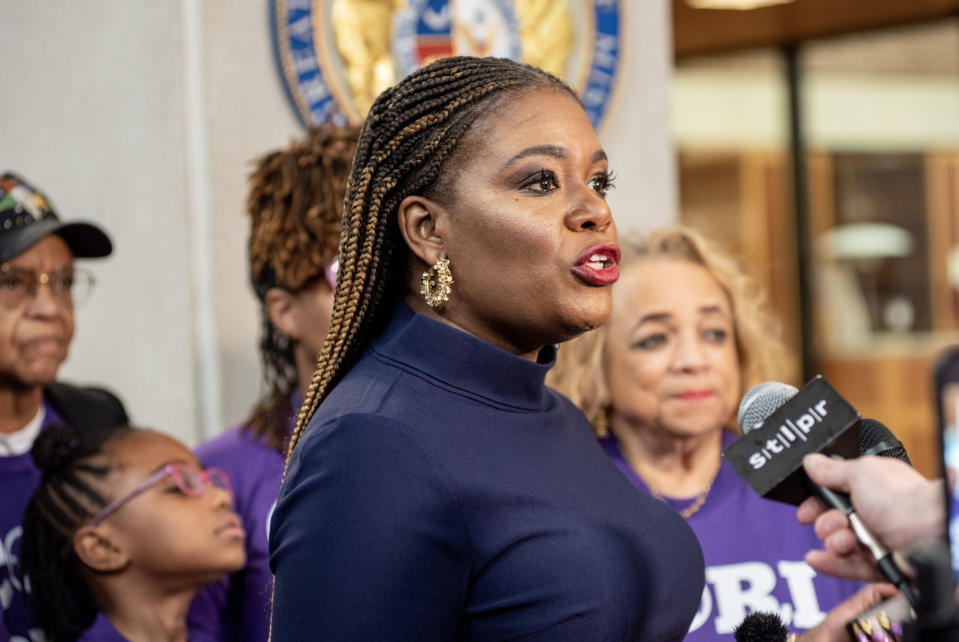Challengers outraise incumbents in Missouri races for Senate, 1st Congressional District
- Oops!Something went wrong.Please try again later.

U.S. Sen. Josh Hawley, left, and Democrat Lucas Kunce (phots by Drew Angerer/Getty Images and Madeline Carter/Missouri Independent).
With one seat in Congress up for grabs, an incumbent facing a serious challenge and a former publisher and media personality taking on a long-time officeholder, this year’s federal elections in Missouri promise an interesting summer and fall.
Add to that the U.S. Senate race, where both likely fall contenders have more money already than almost every other candidate running statewide.
In the 3rd Congressional District, where Republican incumbent U.S. Rep. Blaine Luetkemeyer is not seeking re-election, and the 1st District, where Democratic incumbent U.S. Rep. Cori Bush is being challenged by St. Louis County Prosecutor Wesley Bell, the key battle will be the Aug. 6 primary.
Both districts were drawn by lawmakers to be safe seats for the party in power.
In the 2nd Congressional District, solidly Republican rural counties were added by lawmakers to shore up the GOP’s chances to keep it. Republican U.S. Rep. Ann Wagner and Democratic candidate Ray Hartmann, founder of the Riverfront Times, are the likely nominees for a fall match-up.
In the Senate race, Lucas Kunce, who lost a 2022 Democratic primary in the contest ultimately won by Republican Eric Schmitt, is hoping to unseat U.S. Sen. Josh Hawley, a Republican hoping to secure a second term.
Campaign disclosure reports that were due Monday at the Federal Election Commission are the first indication of which contenders are ready to run full-scale campaigns. And for Hawley and Bush, their challengers managed to outraise them in the first quarter of the year. Hawley’s campaign committee took in $1.9 million between January and April, about $600,000 more than his expenses and leaving his cash on hand on March 31 to $5.4 million. Kunce’s campaign raised $2.3 million, spent $1.2 million and reported $3.3 million in the bank.
More than $1 million of the amount reported by Hawley’s campaign was a transfer from the Hawley Victory Committee, a joint fundraising PAC that raised a total of $1.5 million in the quarter.
In a news release about his fundraising, Kunce said he feels momentum behind his campaign because he has regularly raised more than Hawley over the past year.
“Since last year, we’ve built a worker-led, people-powered, record-breaking coalition to win this race and take this U.S. Senate back for everyday people in Missouri,” Kunce said in his release.
To get to the fall election, Kunce must defeat three primary opponents, including state Sen. Karla May of St. Louis, who reported raising $9,136 in the first quarter and $6,304 in the bank.
The other two primary candidates are December Harmon of Columbia and Mita Biswas of St. Louis. Harmon reported raising $344 in the quarter and had $1,969 on hand.
In the 1st District, which includes St. Louis and much of St. Louis County, Bell entered the race to unseat Bush after flirting with a bid for U.S. Senate. Bell, elected to his current post in 2018, raised $960,000 in the first quarter of the year, outpacing Bush and amassing a big lead in cash on hand.
After filing for re-election, Congresswoman Cori Bush speaks to reporters about her campaign (Annelise Hanshaw/Missouri Independent).
Bush, who is seeking her third term, raised $495,000 in the quarter. She reported $215,000 in the bank, compared to $1.1 million for Bell.
Bush and Bell are both in office because of successful primary challenges to incumbents. Bell defeated long-time prosecutor Bob McCulloch in 2018, while Bush defeated U.S. Rep. Lacy Clay in the 2020 Democratic primary.
Bush easily defeated state Sen. Steve Roberts in the 2022 primary on her way to winning a second term.
The 3rd District, which runs through all or part of 16 counties from the Lake of the Ozarks to the Mississippi River, is the only Missouri congressional seat certain to change hands this year. There is an eight candidate GOP primary, but only three of the candidates – former state Sens. Bob Onder and Kurt Schaefer and state Rep. Justin Hicks – filed disclosure reports with the FEC.
That means the other candidates have raised minimal amounts and have no report due.
On the strength of a $500,000 personal donation, Onder has a big early fundraising lead. His campaign took in $700,000 during the quarter, spent $6,677 and reported $693,000 on hand.
Schaefer raised $118,000, spent $7,063 and reported $110,765.
Hicks, a first-term lawmaker, raised about $45,000, spent $3,462 and had $41,865 remaining at the end of the quarter.
Other candidates in the Republican primary are Arnie C. AC Arn Dienoff of O’Fallon, a perennial candidate; Chad Bicknell of O’Fallon, who lost a primary to Luetkemeyer in 2018; Kyle Bone of DeSoto, who lost a 2018 primary for a Missouri House seat; Brandon Wilkinson of Fenton, who lost to Luetkemeyer in the 2020 and 2022 GOP primaries; and Bruce A. Bowman, a Jefferson City businessman.
Ray Hartmann, left, is planning to run for the Democratic nomination to take on Republican U.S. Rep. Ann Wagner, right. (Getty Images).
Two Democrats, Bethany Mann of Wentzville and Andrew Daly of Fulton have also filed, as has Libertarian Jordan Rowden of Vienna.
In the 2nd District, Hartmann entered the race in mid-March and raised $23,253 by the end of the month. After spending about $3,316, he had $19,937 on hand.
Wagner, who is seeking her seventh term, raised $428,000 and had $2.8 million in the bank at the end of the quarter.
The post Challengers outraise incumbents in Missouri races for Senate, 1st Congressional District appeared first on Missouri Independent.



